|
|
Post by coke & comics on Nov 22, 2015 0:51:59 GMT -5
NOTE: This is a review of an adult comic and an adult television series, not intended for younger readers.
Having just watched the awesome Netflix series, I was in the mood to reread the comic. May as well write a bit about it.
Also, I have a new scanner to play with.
As always, input and discussion welcome. Reading and adding your own reviews encouraged.
|
|
|
|
Post by coke & comics on Nov 22, 2015 0:59:26 GMT -5
Alias #1 (November, 2001) by Brian Michael Bendis and Michaely Gaydos 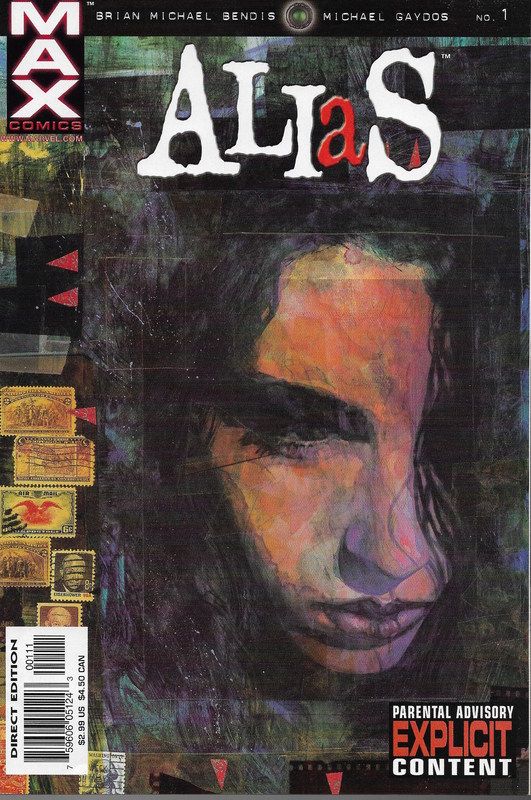 Summary: Summary: Jessica Jones of Alias Investigations tosses an unruly client through her office window. Photos on the wall include her in a superhero costume alongside the Avengers. We learn her superheroing is behind her. Later, depressed, she goes to Luke Cage's bar, and they go home together. A client comes, asking her to find her sister. Jessica tracks down the sister, and finds with with a man. She then accidentally videotapes that man changing into Captain America. Thoughts: "Fuck!" we see shouted in the first panel. And so debuted the Marvel MAX line. No longer bound by the Comics Code or by a need to be friendly for younger readers, we get Marvel's entry into adult comics. A line that in concept is parallel to DC's Vertigo brand, but one which would never reach the same level of acclaim. (DC's Vertigo in some sense is a cross between Marvel's MAX and Icon imprints, a key distinction) I hate retcons. Especially massive ones. This comic imagines that somewhere between the pages of the Avengers comics we all know, there was time for an entire other superhero with the team, just one that never showed up or got mentioned in any comics. She was good friends with Ms. Marvel. It's absurd. But I let that go. This is 2001. The Marvel Universe had long since lost any semblance of being one continuity. So we accept this as some parallel earth, not the ones where the classic Avengers stories were told, and move on. The thing is, I wonder how necessary a retcon was. At the time, Jessica Drew had retired from superheroing and become a private eye. This comic could easily have been about her. Sometimes I wonder if that was the original idea. In 2001, Brian Michael Bendis may well have been my favorite writer (this would change). I had already read and loved his work on Goldfish and Jinx, and was excited to see that noir sensibility blended with superheroes. This was about perfect. A private eye in a superhero world. Discovering a client's wife is a mutant. Catching Captain America putting his costume on. Covers by David Mack, art by Michael Gaydos, all serve to capture that feeling. That this is the seedy corner of the Marvel Universe, the part we don't usually see. 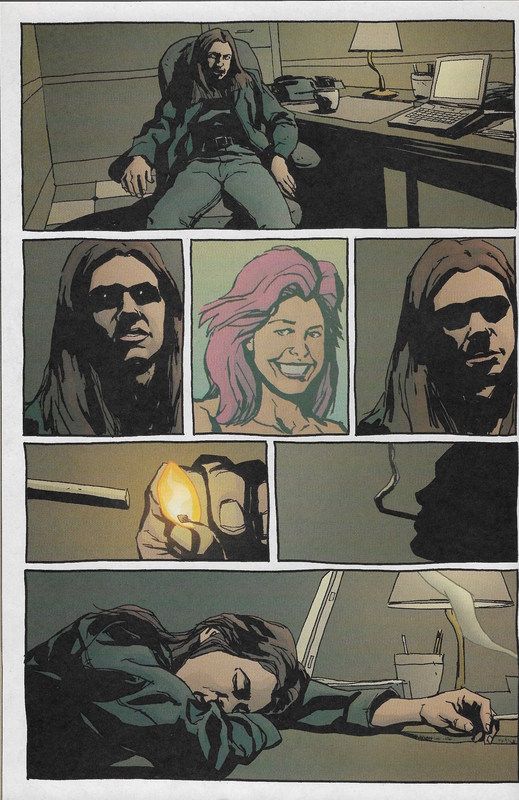 A thing I like about Bendis is that he's not afraid of dialogue. Or silence. And Gaydos is adept at both. A silent scene of Jessica walking home. Or a two-page extended conversation. Clever panel layouts also serve the story well. Particularly a largely white page, where the few panels give a glimpse into what our detective heroine is focused on. 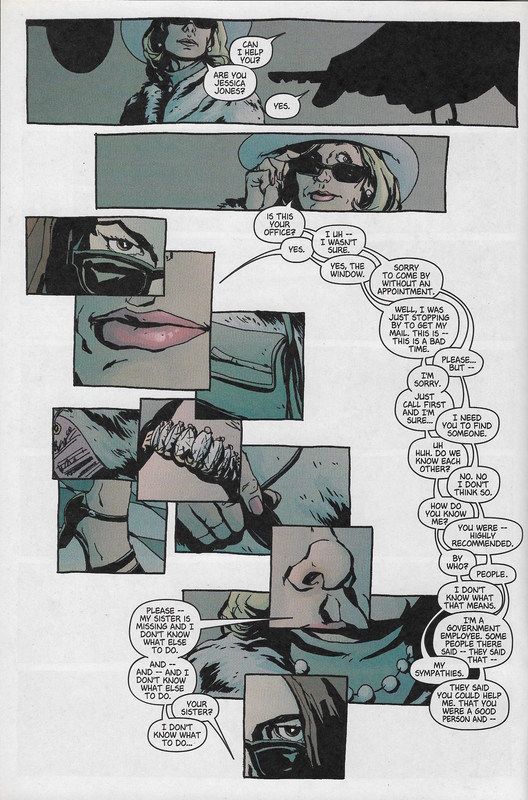 All in all, a great work. Comparisons with television show: The opening of the show is very close to the opening of the comic, with Jessica throwing an unruly client through a window. The differences highlight key thematic differences between the show and comic. The comic is set in a world where superheroes are already common place, and Jessica is a private eye that comes across superhero-y cases. In the comic opening, the man learns his wife is a mutant. In the show, the man learns his wife is cheating on him. Because the show is set in a world where superpowers are not yet commonplace. And so Jessica Jones is a super-powered private eye who is hired to investigate mundane cases.  The comic also deals with an ex-superhero. In the show, a flashback has her dismissing the superhero name and costume. A (smug) nod to the comic, but also a key difference. Similarly, the show establishes the relationship between Jessica Jones and Luke Cage, neither established superheroes. In the comic, Luke Cage has had a long career as a superhero, and the two have a history. Both the show and the comic feature plenty of sex between the two. The show holds onto the idea that Luke Cage owns a bar, as in the comic. Not sure where we first learn Luke Cage owns a bar? Was it here? The narration in this issue makes the point that most of a private investigator's job can be done with Google or cheap online services these days. The show holds true to this. Most of her work in the show is done on her Acer laptop. Grade: A- |
|
|
|
Post by coke & comics on Nov 22, 2015 1:15:25 GMT -5
Alias #2 (December, 2001) by Brian Michael Bendis and Michael Gaydos 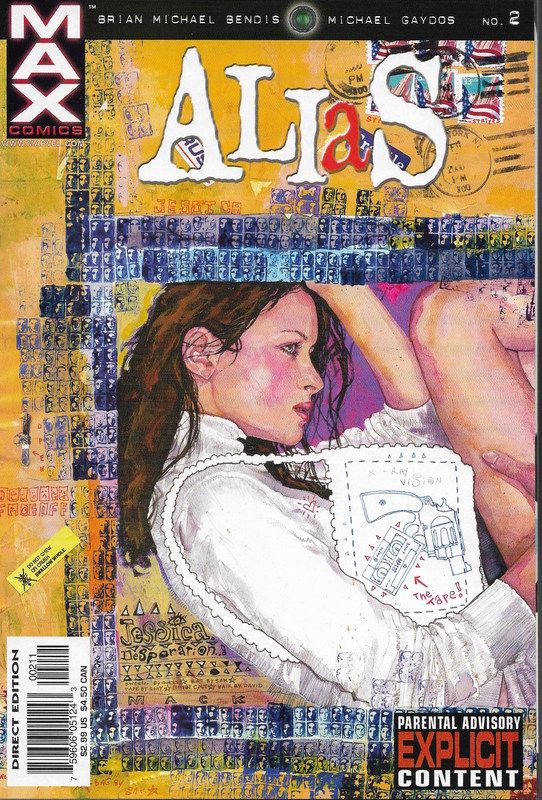 Summary: Summary: Jessica agonizes over what to do about the tape of Captain America's identity, becoming increasingly paranoid about why she was hired for this job. She then learns the woman she had been hired to find, the one she saw with Cap, was killed. She ends up being arrested for questioning in connection to the murder. Thoughts: Art, mood, noir feel... still top notch. Strong narration, dialogue, characterization. As I said about the last issue, I like that Bendis isn't afraid of words. I really like the idea that comics can use both words and pictures to tell the story. Of late, there seems to be emphasis on them being a more cinematic medium. 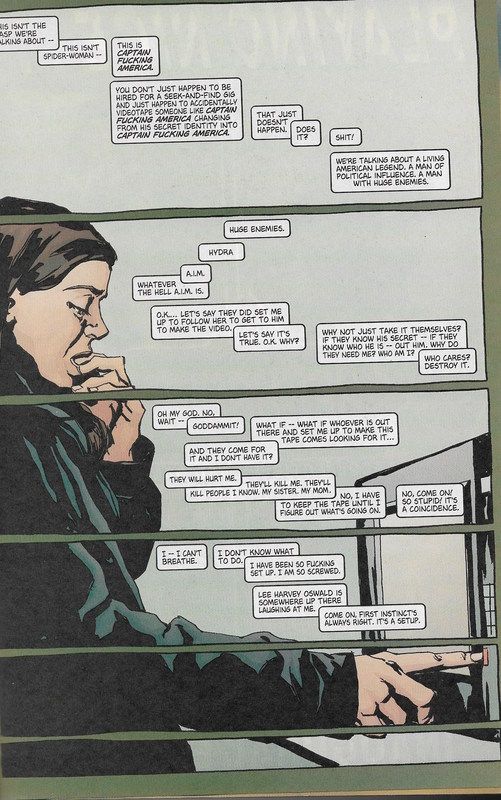 Her paranoia is great. Seeing Luke Cage with another woman is great. Her being almost-but-not-quite in the superhero world is great. I am surprised Avengers Mansion didn't recognize her. You'd think recognizing one-time members would be something it's programmed to do. We still have no idea what her powers are, what her superhero name was, or why she quit being a superhero. Comparisons to television show: In the comic, we learn Jessica has a living mother and sister. In the show, her entire family was killed when she was a child. And she had no sister, only a brother. In the show, she does have an adoptive sister, Patsy Walker. It is not clear from this issue she is not referring to an adoptive sister. Grade: B |
|
|
|
Post by coke & comics on Nov 22, 2015 13:28:53 GMT -5
Alias #3 (January, 2002) by Brian Michael Bendis and Michael Gaydos 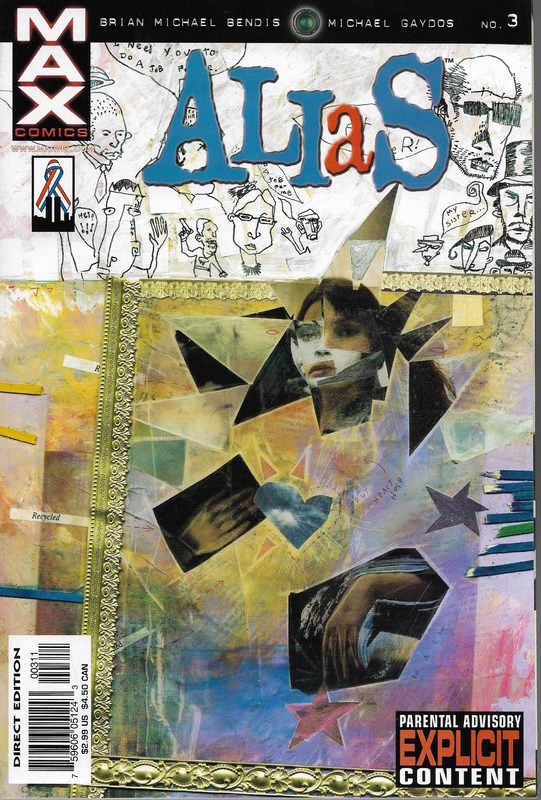 Summary: Summary: Jessica Jones suffers a difficult interrogation about the murdered girl. Matt Murdock shows up to end it and get her released.. Jessica doesn't know him. He says he's a friend of Luke Cage. She tracks down Carol Danvers for help. Carol can't tell her where Captain America is, but can trace down a phone number for her. The trail leads to the presidential campaign of Steven Keaton. Thoughts: Fitting a long conversation where people don't move much into comic book form is hard. Bendis is one of the few to really attempt it, and Gaydos handles it with ease. Narrow panels alternating between the two conversants, each panel basically the same, except to show the differing (or sometimes unchanging) facial expressions. I like it. 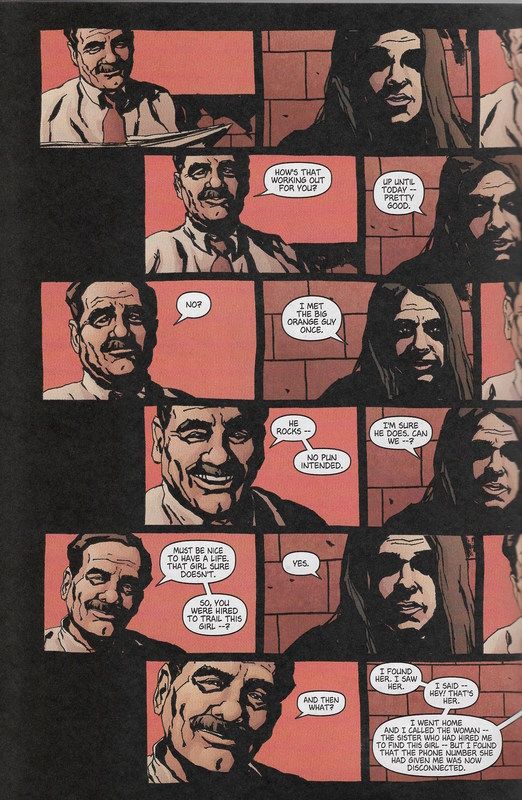 The first 13 pages are a single conversation. We get taken through it on the strength of Bendis' dialogue, and Gaydos' creative panel structuring. We learn a bit more about her superhero days. She is super strong, can kind of but not really fly, and her superhero name was Jewel. We again see the photo on her wall of her and Ms. Marvel, suggesting she and Carol are good friends. Their meeting suggests it's more complicated than that, and that there friendship is somewhat on the rocks. Comparisons with television show: In a flashback sequence, Patsy Walker has made Jessica a costume and suggests she go by the identity "Jewel". Jessica dismisses the idea. Grade: B |
|
|
|
Post by Deleted on Nov 22, 2015 13:43:33 GMT -5
The only bug up my butt about this comic was the art...was that the best they can do?
I got 1-20 in a 'right place, right time' deal, about 50c each...
But I got a great rush opening up the book for the first time and seeing F-words all over the page.
|
|
|
|
Post by coke & comics on Nov 22, 2015 13:46:48 GMT -5
Alias #4 (February, 2002) by Brian Michael Bendis and Michael Gaydos  Summary: Summary: Steven Keaton is running for president on an anti-superhero campaign and is linked to the conspiracy to get Jessica to take video of Captain America's secret identity. Jessica follows the trail, finding the woman who hired her posing as a sister at the campaign headquarters. This leads her to a law firm. She is about to trace a call to see where the trail leads next when she gets attacked by a man with very large hands. Thoughts: I, like many, generally like extrapolation on the superhero world. How does the presence of superheroes come into play in other realities of life, like politics. A partisan divide about superheroes and a campaign built around the opposition's support of the Avengers fits nicely into this mold and works well, I think. This comic also expands on the X-Men themes of mutants being an oppressed minority. A bigoted bartender kicks Jessica out for being a mutant. "'mnot a mutant-- you racist piece of crap." she responds. 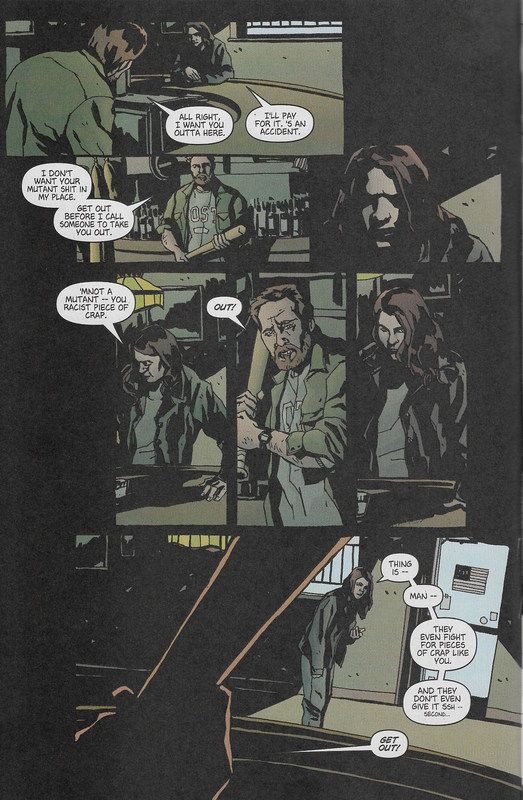 Beyond that, there is generally good intrigue. I like the noirish pattern of straightforward detective work. It's not a mystery with clues you might have missed. It's just a process. The next step is always pretty obvious. You're just following a trail. The phone number was registered to a company. This lead to a campaign headquarters. The woman panicked and called a number. This number took you to a law firm. The lawyer panicked and called a number... I like the rhythm of investigations like this. They feel more natural than a Sherlock Holmes story. Jessica isn't a genius. She just knows her trade. Grade: B |
|
|
|
Post by coke & comics on Nov 22, 2015 15:18:57 GMT -5
Alias #5 (March, 2002) by Brian Michael Bendis and Michael Gaydos 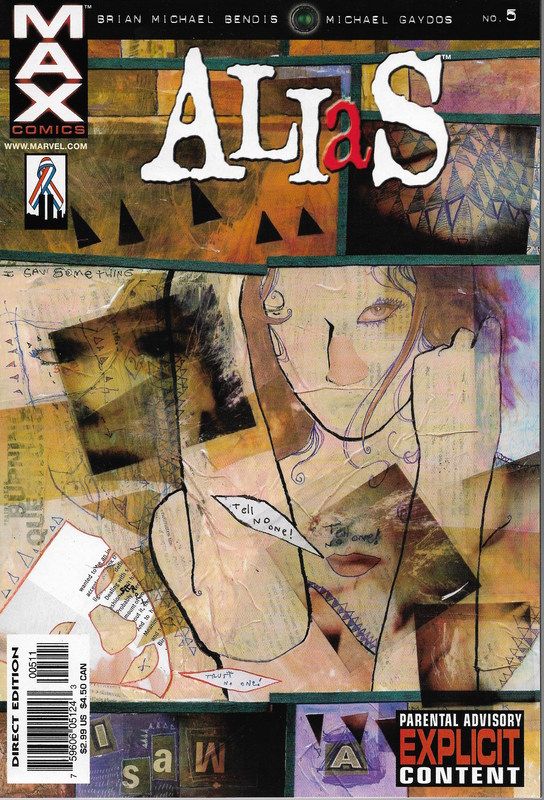 Summary: Summary: Jessica fights and defeats Man Mountain Marko, getting him to admit who he works for. The trail leads to a mobster named Zoumas. He explains the whole evil plan to her, that they just wanted her to make the tape public, either for money or to stay out of prison. It all traces back to political corruption, and donations from the mob to the current president, which were not appropriately paid back in favors. Clay Quartermain had bugged Jessica, heard the whole conversation, and sicced SHIELD on the gangsters. Steven Keaton drops out of the race, citing family reasons. Captain America visits Jessica at the end to thank her for her discretion in the matter. Thoughts: Storywise, it all wrapped up a bit too easy. As I said, I like when detective work is straightforward. But when a gangster just explains his whole evil plan without checking that the person he's talking to is bugged... that's just silly. This issue features the first real fight scene of the series. The narration over it explains that she doesn't really like fighting. But she's good enough at it to defeat Marko. Then we get two more extended conversation sequences, with Zoumas and then with Captain America. 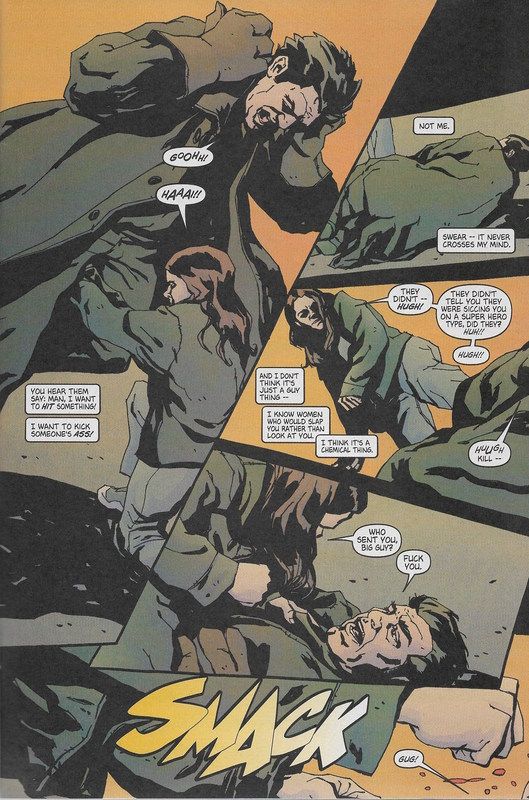 The picture of her with the Avengers in the first issue gave the impression she used to be an Avenger. That was false. Captain America only vaguely remembers her and we learn she'd only visited the mansion a couple of times. (Maybe this retcon can fit into continuity... but I doubt it.) When Captain America says "I honestly can't think of three who would have done this for me", that seems absurd. He seems to be talking about not selling the tape. Even if he means investigating who was behind the tape, that still seems like something that superheroes do for each other all the time. He doesn't think most of the Avengers would have done the same? Beyond that, the conversation is a good one. About why Jessica isn't a superhero anymore. Apparently, not many people quit. She explains she just doesn't have that "thing", that thing that inspires that people like Captain America have. The final moment is a phone call to Carol, suggesting a healing friendship. Overall the biggest mixed bag of an issue. The art remains strong. Gaydos shows he can choreograph an action sequence as well as a conversation. And most artists can't do the conversation like he can. Some good character work, both during the action sequence and at the end. But the I felt plot-wise it was a weak ending to a strong plot. And Captain America's voice just wasn't right. That line in particular was off, but the whole thing was off. All that said, this issue wraps up the first story-arc of a great series. Smart idea, cleverly executed, a strong character, and a great new addition to the Marvel Universe, one of the few successful additions in the last 50 years. Successful enough to have an adaptation to your name while not being an old-school creation puts Jessica Jones in the same league as Wolverine, Punisher, and Elektra. (And Rocket Racoon, and Baymax... perhaps it's not the exclusive club it used to be.) None of the issues of the series yet have a title, and this first arc seems to have no title either. It's just the first arc. Comparisons with TV show: The TV show wasn't willing to spend the money to get Chris Evans to appear. So no cameos of Captain America like the comic gets. The show does take a moment from this comic. When Jessica confronts the mobsters, they point a gun at her and she claims to be bulletproof. A bluff. She tries the same bluff in the show, but in the show her bluff gets called. Grade: C+ |
|
|
|
Post by spoon on Nov 22, 2015 21:31:03 GMT -5
I only started reading Alias in the past month, because I thought it would be interesting to have some basis for comparison. I've read the first two TPBs. Even though the TV series is pitched as being psychological story than superhero story, I actually think the comic series (as far as I've gotten) is the one that is more unconventional. I feel like comic Jessica Jones is less competent than TV Jessica Jones. She's pushed around by paranoia and neurosis. She stumbles upon successful results as much as she achieves them. There are really aren't many moments to cheer on Jessica kicking butt. The fight with Man Mountain Marko is the exception rather than the rule. TV Jessica is much more a heroic figure. Having said that, Alias is pretty interesting as a character study, and I'm thinking of picking up the other trades (which are out of print, but the 3rd is being released in a new edition soon).
I don't think the non-inclusion of Captain America on the show was just a budget consideration. I think Marvel probably wants to allow each new character to get established without being overshadowed.
|
|
|
|
Post by coke & comics on Nov 23, 2015 0:24:31 GMT -5
I only started reading Alias in the past month, because I thought it would be interesting to have some basis for comparison. I've read the first two TPBs. Even though the TV series is pitched as being psychological story than superhero story, I actually think the comic series (as far as I've gotten) is the one that is more unconventional. I feel like comic Jessica Jones is less competent than TV Jessica Jones. She's pushed around by paranoia and neurosis. She stumbles upon successful results as much as she achieves them. There are really aren't many moments to cheer on Jessica kicking butt. The fight with Man Mountain Marko is the exception rather than the rule. TV Jessica is much more a heroic figure. Having said that, Alias is pretty interesting as a character study, and I'm thinking of picking up the other trades (which are out of print, but the 3rd is being released in a new edition soon). I don't think the non-inclusion of Captain America on the show was just a budget consideration. I think Marvel probably wants to allow each new character to get established without being overshadowed. While I'm sure that is true, it marks the major difference between the show and the comic. The comic really depends on the Marvel Universe existing, much in the same way that Marvels does. Or perhaps the She-Hulk series where she practices superhero law. She's the ex-superhero PI of the MU in the comic. In the show, she's a super-powered PI. |
|
Confessor
CCF Mod Squad
Not Bucky O'Hare!
Posts: 10,197 
|
Post by Confessor on Nov 24, 2015 3:52:09 GMT -5
I got 1-20 in a 'right place, right time' deal, about 50c each... Same here. Well, not quite as cheap as your deal, but close. I picked up the whole run, excluding the Jessica Jones What If... issue, in the £1 a comic box of my local comic shop. Such a great series and an absolute steal at that price. I might have to break those issues out over the next week or so and add some comments to this thread. Weirdly, I have absolutely no interest in the TV series at all. |
|
|
|
Post by coke & comics on Nov 26, 2015 20:08:14 GMT -5
Alias #6 (April, 2002) by Brian Michael Bendis and Michael Gaydos 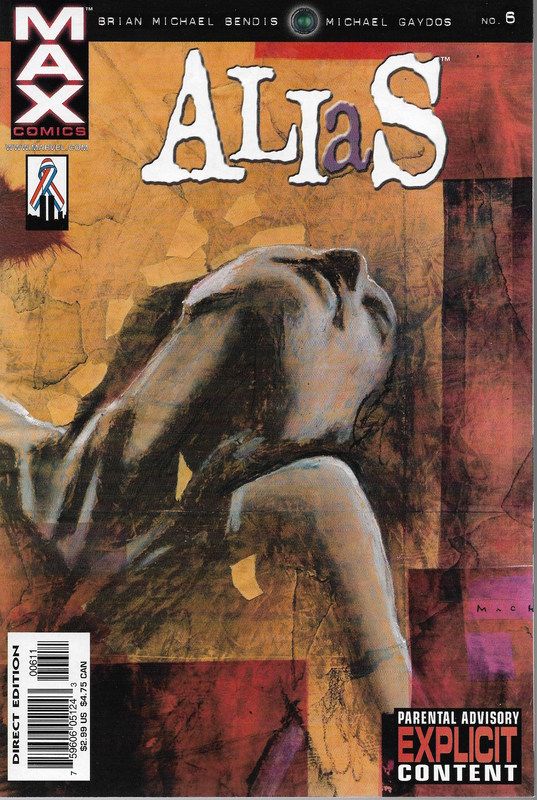 Summary Summary: Jessica sits down with Carol Danvers for lunch and some girl talk. She later works on her case, pretending to be a gay man on the internet to out a client's gay husband. While she's in the restroom, a random person enters her office to answer her phone for her. It's a kid who claims to be a fan. At the end, a tear-eyed client enters, asking Jessica to help find her husband, Rick Jones. Thoughts: Bendis continues to enjoy the liberties the Max line offers. This may be the first Marvel comic to ever include the phrase "throbbing cock". And it gets it in there twice. I'm going to have to keep harping on this point, because I find it so unique within Marvel comics, and even within comics generally. Bendis is able to fill an entire issue with just a couple conversations. The first half of the issue can be summarized as "Jessica and Carol have lunch". But the dialogue is engaging, and Gaydos keeps finding interesting ways to convey the complete lack of anything happening. Given literally nothing to work with by the script, it's all on Gaydos to fill those first 10 pages with art that conveys two women having lunch, while keeping the reader engaged. It's impressive. Ditto for the 5-page sequence of Jessica typing on her computer. 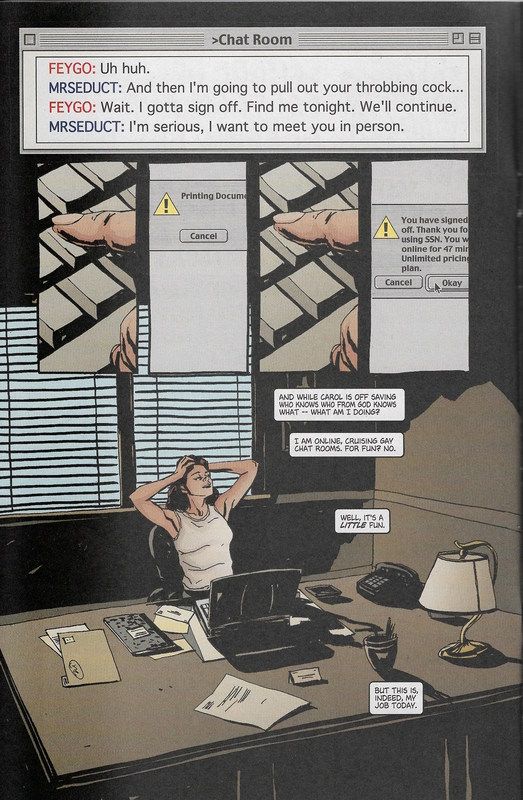 Now let's talk about the dialogue. I was a big Bendis fan. I'm not now. Goldfish and Jinx remain among my favorite comics, because I think the dialogue is just excellent. I think he captures the way these people would talk well. When he took the voice of a Goldfish character and started giving to superheroes, I quickly looked at him askance. That's how Goldfish talks. Not how Hawkeye talks. And I think this gets to why I thought Captain America's dialogue sounded off in the previous issue. Now Captain America has had many voices over the years, many takes. Gruenwald's style and Brubaker's are night and day, in some ways. But in others, they both work. They both fall within the general spirit of this iconic character. From Simon to Lee to Englehart to Kirby to Stern to Demateiss to Gruenwald to Waid to Brubaker... there is enough of a trend, enough of a sense of a single character, that you can point to some core defining elements within what he sounds like. Just enough to know when he sounds wrong. Jessica Jones is a new character. So Bendis gets to define her voice. (Perhaps it's best she's a new character, as opposed to being a Jessica Drew comic, as I suggested in a previous review) But Carol is an established character. Or is she? We got to know her as a supporting character in Captain Marvel, under frequently rotating scribes. She went from supporting character to superhero in her own right, and was given her own series. But Conway defines basically a new voice and role for her. It was such a left turn from her appearances is Captain Marvel, it's almost hard to call her the same character. Conway's take was refined by Claremont. But when she showed up in the pages of Avengers, she seemed a different character again. In fact, so egregiously so, that Claremont's single issue of Avengers, he wrote what is perhaps her character's defining moment, where she tells off the Avengers, as proxies for Jim Shooter, for their treatment of her. In the pages of X-Men, Claremont tried to continue the arc he had set her on, finding a new role for her amidst the Starjammers as Binary. Busiek reinvented her once more in the pages of Avengers. Busiek obviously knows his history and tried his best to create a character true to all the previous versions, and that would flow as organically as possible. But really, this may as well have been a whole new character again. Bereft of her Binary powers, back in a variant of her Ms. Marvel costume, going by the name Warbird, struggling with alcoholism. This is where we are at the time of this issue, in the waning days of Busiek's epic run on Avengers. So I have trouble telling Bendis he has Carol's voice wrong. He's doing no worse than Arnold Drake on that score. The Carol in this issue is as in line with Carol as anything else. I haven't followed the character recently, but she actually seems to be at the height of her popularity after some 40 years as a B-lister. Going by Captain Marvel these days, and soon to star in the Captain Marvel film, chosen against my vote over Mar-Vell, Monica, and Genis. Grade: B- |
|
|
|
Post by coke & comics on Nov 26, 2015 20:31:17 GMT -5
Alias #7 (May, 2002) by Brian Michael Bendis and Michael Gaydos With Bill Sienkiewicz 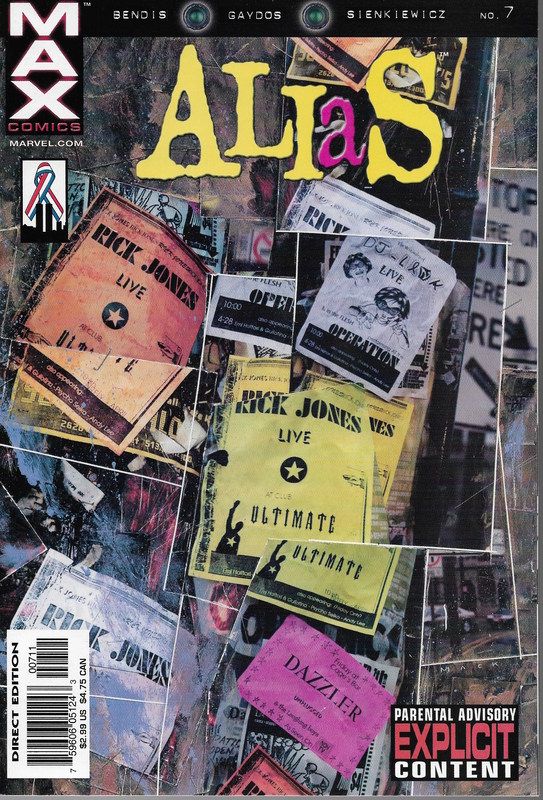 Summary: Summary: Jessica Jones agrees to track down Rick Jones at his wife's request. She finds him in a club performing his guitar. When she confronts him, he seems a little paranoid. Thoughts: Rick Jones dedicates his rendition of "Changes" to his pal Bruce. Astute readers are curious how to reconcile Rick's performance in New York with his current adventures with Captain Marvel. I assume Bendis will clear this up. The opening is identical in layout to the last time Jessica had a client in her office. She listens while the client tells her story. The client claims Jessica and Rick Jones are related. Who is she, Roy Thomas? The comic includes excerpts from Rick Jones' book Sidekicks. Some text, and some artwork, rendered here by Bill S. (I spelled it at the top of the page, not trying again). Bill's few pages alone are worth the price of admission. 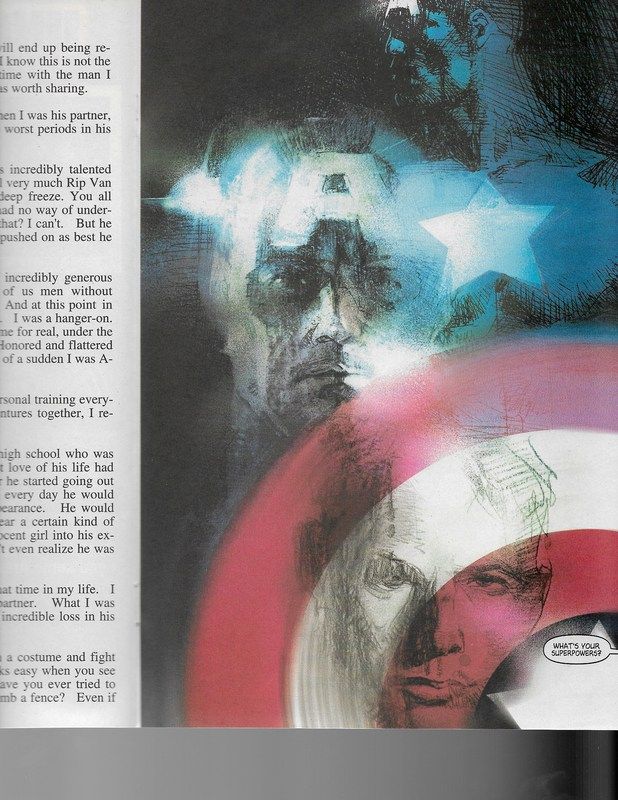 Also the text pieces offer interesting insight into the characters. Captain America's attempts to make Rick Jones into Bucky get described in terms of a guy having trouble letting go of an ex. Comparisons with television show: The show needed more of this, good old-fashioned private eyeing. Interestingly, I have come to disdain episodic things and like series that tell a single novel-like story, as Jessica Jones did. But a bit more private eyeing that didn't tie into the show's overall arc would have helped establish her character. The scene of Jessica on the toilet is very similar to a scene from the show. Hard to tell if it's an intentional homage. Only so many ways to depict a character sitting on the can. 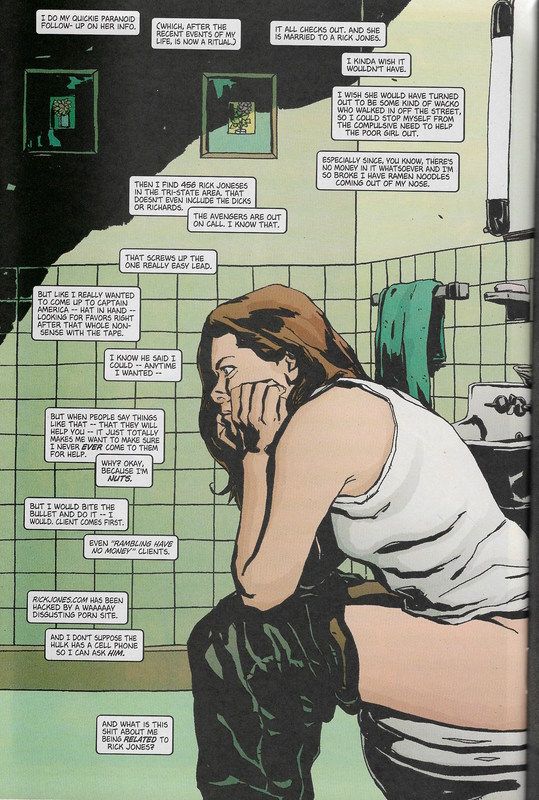 Grade: Grade: B |
|
shaxper
CCF Site Custodian
Posts: 22,860
|
Post by shaxper on Nov 26, 2015 23:12:13 GMT -5
Embarrassing layman question: the Jennifer Garner TV series has nothing to do with this, right?
|
|
|
|
Post by Slam_Bradley on Nov 26, 2015 23:18:23 GMT -5
Embarrassing layman question: the Jennifer Garner TV series has nothing to do with this, right? Nope. |
|
|
|
Post by Phil Maurice on Nov 26, 2015 23:34:54 GMT -5
Embarrassing layman question: the Jennifer Garner TV series has nothing to do with this, right? Nope. Sorry to step on Slam's long-winded yet accurate reply, but the TV series you mention has nothing at all to do with the comics being reviewed. It shouldn't feel embarrassing or simple of you to ask; I've run across this same convolution numerous times over the years. It reminds me of the "Avengers" debacle back in '98.  |
|